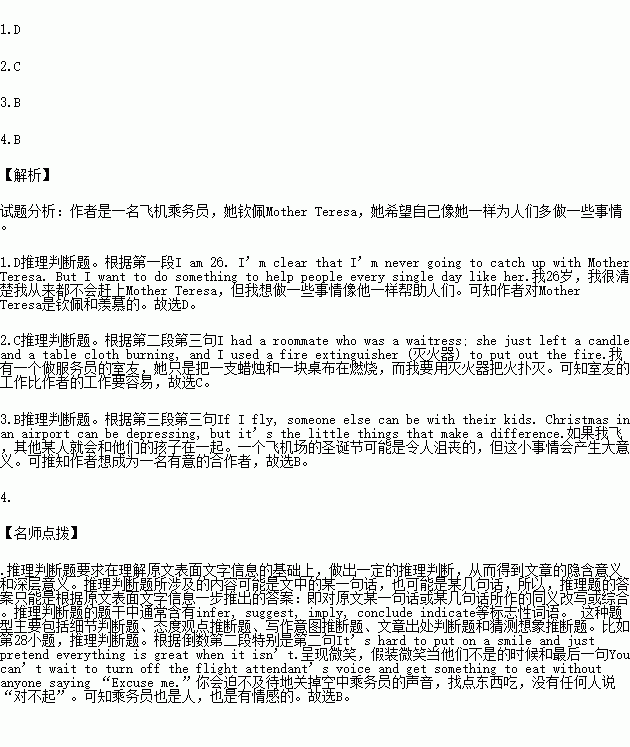题目内容
I am 26. I’m clear that I’m never going to catch up with Mother Teresa. But I want to do something to help people every single day like her.
Everybody thinks we just serve food and soda. The safety training is serious and stressful. Caring for 49 people in a business class in 90 minutes is not easy. I had a roommate who was a waitress; she just left a candle and a table cloth burning, and I used a fire extinguisher (灭火器) to put out the fire. If something goes bad at her job, she calls the police. But if something happens up in the air, it’s up to us.
I’m single and have no kids. I’ve flown every Christmas since 1995. If I fly, someone else can be with their kids. Christmas in an airport can be depressing, but it’s the little things that make a difference.
We’re not robots. It’s hard to put on a smile and just pretend everything is great when it isn’t. I’ve seen co-workers lose a family member the day before a trip and just pull themselves together (take control of their feelings and behave in a calm way). At the end of a 14-hour flight, it’s like, “It was really nice to help you, but I’m ready for you to get off the plane.” Those last 15 minutes can be the longest 15 minutes of your life. You can’t wait to turn off the flight attendant’s voice and get something to eat without anyone saying “Excuse me.”
Sometimes I go all day and never hear a “please” or a “thank you.” When you say thank you, it’s huge. It makes us feel like you actually see us as fellow humans. We’re up there together at a height of 30,000 feet, enjoying the miracle (奇迹) of the modern flight.
1.What’s the author’s attitude towards Mother Teresa?
A. Grateful. B. Fearful.
C. Doubtful. D. Admiring.
2. How did the author like her roommate’s job?
A. It was the same as hers.
B. It was more interesting than hers.
C. It was easier than hers.
D. It was more serious than hers.
3.Why does the author fly every Christmas?
A. Because she has nowhere to go.
B. Because she’s trying to be a helpful co-worker.
C. Because she owes her co-workers some favors.
D. Because she’d like to earn more money.
4.What does the author imply by saying the underlined sentence “We’re not robots”?
A. Flight attendants are not stronger than robots.
B. Flight attendants also experience emotions.
C. Flight attendants get tired while robots don’t.
D. Flight attendants need to rest now and then.

